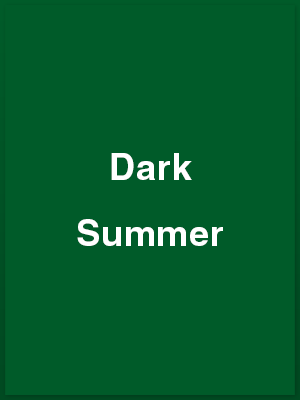The Barn Theatre, Southwick Community Centre
October 1 & 2 1954
Dark Summer
by Wynyard Browne
Directed by
Betty Carpenter

Cast
Sylvia Chatfield – Miss Loder
Betty Gedge – Gisela Waldstein
Brian Cooper – Stephan Hadow
Betty Carpenter – Mrs. Hadow
Sylvia Sartin – Judy Van Haan
Production Crew
Stage Manager – Ralph Dawes
Lighting – Frank Hurrell
Effects – John Chatfield
Properties – Maureen Futcher
Properties – Betty Perry
Decor – Elizabeth Penney
Review #1: Dark Summer
Publication: Shoreham Herald
Publication Data: October 8 issue – page 20
Reviewer: D.M.
Text Header: “Dark Summer made it a bright autumn night”
Text Content:
YOUNG WICK PLAYERS presentation last Friday and Saturday of Dark Summer provided some fine entertainment for visitors to the Barn Theatre, Southwick. Sylvia Sartin, in the rôle of the rather frivolous glamour-girl, was a great success. Her lines were delivered naturally and so at home did she appear to be on the stage that her entrance put the remainder of the cast completely at their ease. There was a notable lack of strain about her portrayal that was very satisfying.
Betty Gedge as the sympathetically understanding Jewess refugee, stated weakly, but improved as the play gained momentum. Her accent was good and indicated mush practice. Brian Cooper, in the rôle of a war-blinded airman, delivered his lines with an unfortunate lack of conviction. This, however, was more than compensated by his portrayal of a sightless man. As he groped his way about the set I felt that the dark glasses he wore must have been treated with an opaque substance.
Starting with the disadvantage of being poorly cast as the airman’s mother – she seemed to be far too young – Betty Carpenter nevertheless managed a trying rôle fairly well. She played to life the somewhat narrow-minded Mrs. Hadow, even though it was at times difficult to reconcile her apparent youth and stage age. Another character I was always glad to see step from the wings was the head-in-the-clouds paying guest. Sylvia Loder was most convincing.
Back-stage help was given as follows: Stage manager, Ralph Dawes; lighting, Frank Hurrell; effects, John Chatfield; properties; Maureen Futcher, Betty Perry; decor, Elizabeth Penney.
Review #2: Dark Summer
Publication: Unknown
Publication Data: Unknown
Reviewer: Unknown
Text Header: “Dark Summer” Presentation By Young Wick Players
Text: Content
A MOVING and convincing performance by Betty Gedge as a Jewish refugee from Austria was the highlight of the Young Wick Players’ production of Dark Summer, by Wynyard Browne, at the Barn Theatre, Southwick, at the week-end. To maintain a foreign accent throughout the play is a difficult feat but Miss Gedge never once faltered, and her natural acting ability added to the authenticity of the rôle.
The play itself is a sombre piece dealing with the reactions of a young man, recently blinded, first to the girl-friend he had when he could see, and secondly to the ugly Jewish refugee who cared for him when he was ill. The question posed is: Which of the two women will he chose for his wife if his operation proves successful?
There was a rather slow performance from Brian Cooper as the young man, although he improved when his dark glasses were taken off and he could walk about the stage quite normally. Betty Carpenter, as the young man’s mother, laboured under the handicap of being too young for the part, but she acted well and gave an illusion of age.
Sylvia Chatfield as a trying old companion was good in parts, though she too, was inclined to be slow. Sylvia Sartin as the young man’s girl-friend was spirited and bright, and brought a little colour into an otherwise melancholy play.
Review #3: Dark Summer
Publication: Unknown
Publication Data: Unknown
Reviewer: Unknown
Text Header: “Play with an unusual ending”
Text: Content
DARK SUMMER, a play with an apt title and an unconventional ending, was the first presentation this season [web ed: Wick has always run a season beginning in the Autumn] of The Young Wick Players, at the Barn Theatre, Southwick, last week.
The first play written by Wynyard Browne, it may not be so well known as his later successes [The Holly and the Ivy and A Question of Fact] but it has a compelling theme and is good ‘theatre’. Stephan Hadow, recently blinded, is about to undergo a decisive eye operation. A terse, introspective young man, he is the hub around which the Hadow household revolves. His mother’s possessive protection only adds to his indecisiveness. Miss Loder, the paying guest, fusses over him with old-maidenly concern. Gisela Waldstein, once a chemist, now the servant of the Hadows, is a young, Jewish refugee from Austria. To Stephan, Gisela has become indispensable, the confidant to share his deepest thoughts, even to act a ‘go-between’ in his correspondence with Judy, his fiancée.
Betty Gedge held the stage as Gisela, acting with naturalness and feeling. Her accent was convincing as her characterisation. Brian Cooper, in a difficult part, did not altogether compel the compassion of the audience, although his restrained, and rather static, representation of Stephan came to life in the latter part of the play.
Betty Carpenter, as the mother, had the authoritative manner, though a rather young appearance. Her delivery was good and her voice flexible. Sylvia Sartin, well cast as Judy, had attack and moved well. Sylvia Chatfield’s eccentric Miss Loder gave the relieving touch of comedy in this drama.



